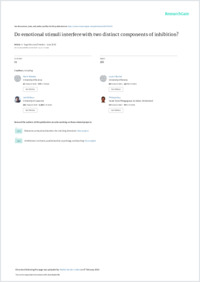Do emotional stimuli interfere with two distinct components of inhibition?
-
2014
- Routledge ; London
Published in:
- Cognition and Emotion. - 2014, vol. 29, no. 3, p. 559-567
English
Emotions have recently been shown to interfere with the efficacy of inhibitory control. However, understanding their impact requires taking into account that inhibition is not a unitary construct, but consists of distinct functions underlain by specific mechanisms. In this study, 88 participants performed two emotional versions of classic laboratory tasks designed to assess (1) the ability to inhibit a prepotent response (a stop-signal task using faces with different emotional expressions) and (2) the capacity to resist the effect of proactive interference (PI; a recent negative task that included emotional words). Overall results showed that emotional stimuli interfered with inhibition capacities in both tasks. Although tending in the same direction, these results suggest that different underlying mechanisms (e.g., top-down vs. bottom-up processes) or consecutive differences in emotional processing (e.g., different interactions with stimulus/task properties, processing stages or motivational aspects) are at play in these two inhibition-related functions.
- Language
-
- English
- Other electronic version
- License
-
Rights reserved**This article may be used for research, teaching, and private study purposes. Any substantial or systematic reproduction, redistribution, reselling, loan, sub-licensing, systematic supply, or distribution in any form to anyone is expressly forbidden. Terms & Conditions of access and use can be found at http://www.tandfonline.com/page/terms-and-conditions**
- Identifiers
-
- HEPVS 9WP3NI7M
- DOI 10.1080/02699931.2014.922054
- Persistent URL
- https://fredi.hepvs.ch/hepvs/documents/321421
Statistics
Document views: 80
File downloads:
- Full-text: 164
